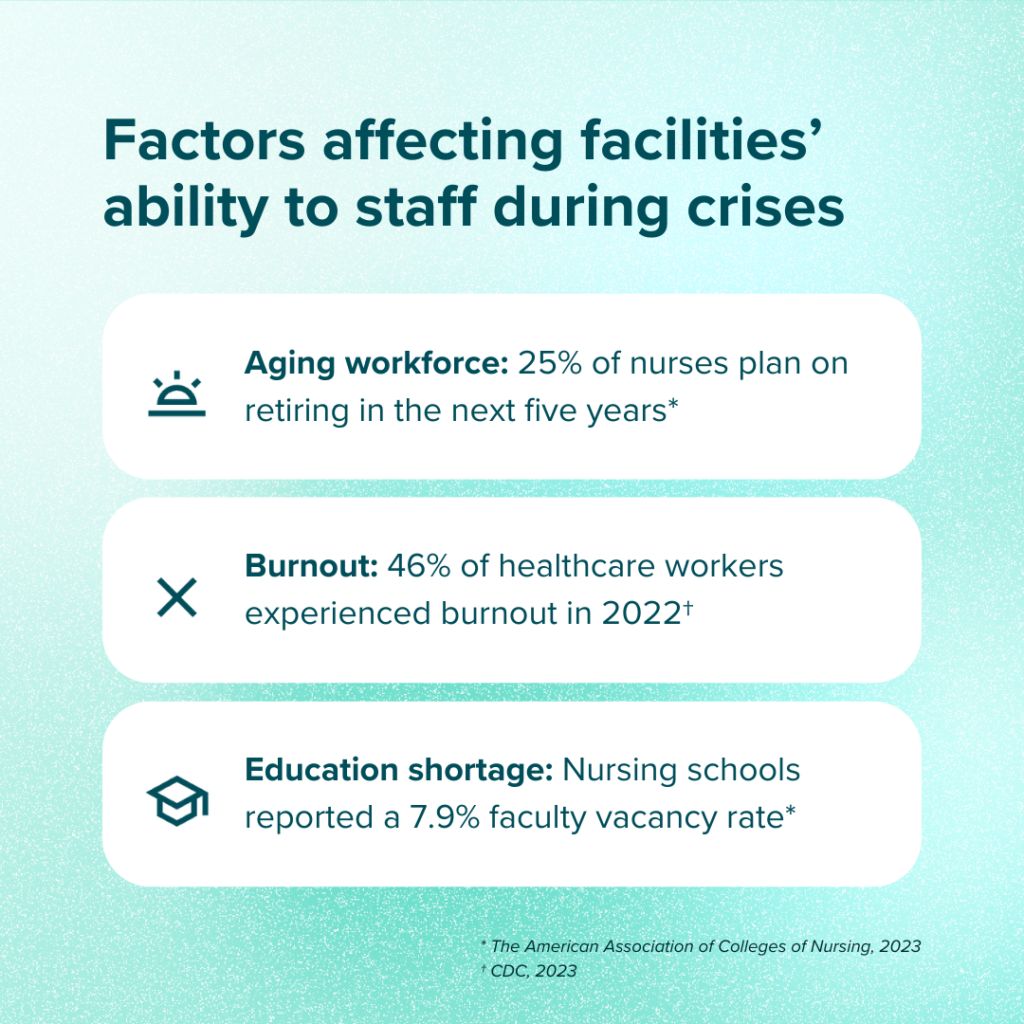When disaster strikes, healthcare facilities become the hubs of intense, fast-moving, life-saving activity. Normal routines are pushed aside, the pace accelerates, and the staff does its best to attend to everyone in need. Emergencies vary widely, each requiring a different set of resources to treat the volume of patients and the injuries or illnesses the emergency creates. Your facility has to be prepared with a strong healthcare staffing strategy for any and all possibilities.
Your most important resource is your people — staff with skills and experience to handle the crisis. But many facilities do not have enough staff to handle the enormity of a major disaster. There are two crises at work here, including the one bringing patients to them in droves and an internal staffing crisis. Therefore, your emergency management planning needs to address how you will cover the temporary need for even more staff.
Fortunately, the additional people you need can be found outside of your facility through contingent nurses and allieds. This is a great staffing solution for urgently needed professionals with the experience and credentials to jump into a major crisis and provide excellent care.
Here, we explore the nature of crises healthcare facilities may face, the challenge of ensuring enough staff to respond as needed, and the solutions contingent staff can offer.
The Crises Healthcare Facilities May Face
A crisis can take many forms. These events, considered public health emergencies, may include:
- Natural disasters
- Infectious diseases
- Accidents involving mass casualties
- Utility and IT outages
- Terrorist attacks and other violent acts
- Release of hazardous materials
Some of these crises may take place within the healthcare facility itself and impair its ability to provide care. Power outages, equipment failures, and hazardous materials come to mind as examples.
Crises can also derive from seasonal events, such as holidays and school breaks. These are times when more people travel and gather, and sometimes they have accidents or encounter the crises listed above. Such a vast range of incidents requires an equally wide range of resources and healthcare professionals’ expertise to be prepared to respond.
Interested in learning how Medely helps transform healthcare staffing strategies? Schedule a demo at the link below.
Preparedness: Staffing Essentials
Healthcare staffing on the Front Lines of the Crisis
For any type of crisis, you need to be prepared with strategies and plans that allow you to respond quickly and effectively to anything that comes your way. According to the Agency for Healthcare Research and Quality, surge capacity is your ability to expand your services to respond to the sudden and significant increase in demand due to a critical incident.
In its 2009 report, the Institute of Medicine recommended planning for and tracking essential resources most likely to be needed in a crisis, as well as resources at risk of scarcity. In addition to equipment, facilities, means of transportation, and medications, their list included healthcare providers. Similarly, the Agency for Healthcare Research and Quality offers the Four S’s, essential requirements of surge capacity — staff, stuff, structure, and systems.
Both stress the importance of having the right number of nurses and allieds to treat and triage patients and administer medications. Nurses and allieds are always essential to your healthcare planning, and they are especially so during a crisis.
That said, many hospitals and other facilities do not have enough staff to cover their normal needs, let alone an emerging crisis. Understaffing can bring increased risks to the patients and to themselves. Safety can be compromised, and critical mistakes may be made.
The Healthcare Staffing Shortage
Healthcare organizations need an increase in nursing staff to meet the surge in demand for services. Unfortunately, growing your nursing staff is a challenge even on a normal day, because for the past several years, there has been a shortage of nurses.
The nursing profession has struggled with an increase in demand for nurses but a shortage of available candidates. Several factors are influencing this shortage. Major factors include:
- Nurses are aging along with the general population. Many are over age 50 and close to retirement.
- Nurses in understaffed facilities are experiencing burnout from overwork and exhaustion, and they’re motivated to leave.
- There is a critical shortage of nursing school instructors and programs, so there are fewer new nurses available to replace those who leave.
It’s critical to a successful workforce strategy to introduce or expand the use of contingent labor resources in order to meet your patient demand.

Including Contingency Staff in Your Crisis Strategy and Plans
Quick Access to a Pool of Experienced Professionals
Crises are infrequent, unusual events requiring staff to step away from the normal and jump into overdrive. A sudden influx of seriously affected patients can quickly overwhelm a facility if it’s already understaffed.
If you don’t have the staff to cover sudden influxes of patients, you need an immediate healthcare staffing solution. This means quick access to staff with the experience and skills to handle a crisis in an unfamiliar setting.
One effective solution is temporary, per diem professionals. You don’t have time for an extensive search for candidates. But a staffing agency like Medely can perform that function for you. You gain instant access to a deep talent pool. Contingency staff is already vetted and verified, fully qualified, and experienced to round out the staffing you need right away.
Partner with Medely to create an impactful healthcare staffing strategy
Disasters can arise without warning. Your staff must quickly move beyond normal and provide care to several times the usual patient volume. When staffing is already stretched beyond normal limits, contingent staffing can fill the critical gaps.
When you’re creating or updating your crisis management strategy and plans, include contingency staffing. You need quick access to high-quality additional professionals. Medely can partner with you to help you develop your plan and determine what kind of staffing you will need. We can provide a variety of professionals, including:
- GI techs
- LVNs
- Medical assistants
- OR/Circulating RNs
- PACU
- Pre-Op
- Surgical techs
- And more
Medely can connect you with a pool of over 300,000 professionals. Partnering with you, we can help you enhance the staffing plans in your healthcare crisis management strategy. Contact Medely today to start planning with us.



